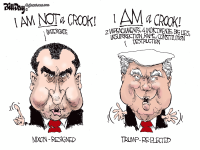signalmankenneth
Verified User
If I was Elon, I would double my body guard detail?!!
The termination notice came just before Valentine's Day, and Elena Moseyko's heart was shattered as she broke down crying in front of her two young children.
She has bills to pay – a mortgage, preschool tuition, a car payment – and a scared family.
“I feel so angry now at the administration because I traumatized my kids,” she said. "I wish I would’ve never joined the federal government.”
Moseyko joined the U.S. Department of Veterans Affairs last year as a data scientist. She’d been “happily employed” in the private sector for a consulting firm but thought a government job seemed more stable.
Instead, her life was turned upside down last week after President Donald Trump’s administration began instituting mass layoffs as part of an aggressive effort to trim the federal workforce.
Harrison Fields, a special assistant to the president, said in a statement to USA TODAY that Trump "returned to Washington with a mandate from the American people to bring about unprecedented change in our federal government to uproot waste, fraud, and abuse."
"This isn’t easy to do in a broken system entrenched in bureaucracy and bloat, but it’s a task long overdue," he said.
USA TODAY spoke to federal workers fired from the departments of Education, Veterans Affairs, Agriculture and Transportation who said they were shocked, angry and emotionally distraught by the terminations. They were scrambling over the weekend to figure out how to file for unemployment benefits and reviewing their budgets to adjust to a new financial reality.
They worried about everything from making rent to paying student loans. Many talked about going into government work because they value public service and feeling like those values are being trampled.
"I'm much more angry than devastated," said Chelsea Milburn, a 34-year-old Navy reservist, who lost her job as a public affairs specialist for the Department of Education. "It took away my hope that I would continue to be respected and valued for my service. And especially in the way the termination happened."
"The agency finds, based on your performance, that you have not demonstrated that your further employment at the agency would be in the public interest," multiple federal workers told USA TODAY their termination letter read.
"It read like a copy-and-paste letter that did not provide any specifics," Milburn said. "It was just very cold and cruel."
She said her teleworking job was a near-perfect situation after her life dramatically changed two years ago, first with a bout with COVID-19 and then being diagnosed with POTS, a disability that makes it hard for her to sit at a desk full-time.
Milburn was one of the nearly 70 employees in the education department still within their probationary periods who were let go Wednesday night. Federal employees in probationary status have typically been hired within the past year.
They are easier to fire because they lack the bargaining rights that career employees have to appeal their terminations. But some who had been in their departments longer than that got caught up, too.
Doug Berry, who worked for U.S. Department of Agriculture Rural Development, left his former career in real estate for his job at the USDA for more stability, was hired as a loan technician last January. But in July, the 53-year-old chose to take a position as a pathways intern instead, in part because it would give him a better career path after the probationary period, but also because he wanted to pursue an MBA at the same time.
His probationary period reset, but he couldn't have known at the time what that would mean.
Berry said his termination letter was emailed to him close to 5 o'clock Thursday and was effective at the end of that business day, but his office closes at 4:30 and he was already gone for the day. He showed up Friday morning to discover his job was gone.
"I got to donate an hour of my time to clean out my desk and hand off what I was working on to my coworkers," he said.
At least five unions representing government workers have filed suit over the administration’s firing of probationary workers, alleging it breaks the formal process used by government agencies to dismiss employees.
"These firings are not about poor performance – there is no evidence these employees were anything but dedicated public servants," said Everett Kelley, president of the American Federation of Government Employees, which represents about 800,000 federal workers.
https://www.yahoo.com/news/fired-federal-workers-cold-cruel-110600101.html

The termination notice came just before Valentine's Day, and Elena Moseyko's heart was shattered as she broke down crying in front of her two young children.
She has bills to pay – a mortgage, preschool tuition, a car payment – and a scared family.
“I feel so angry now at the administration because I traumatized my kids,” she said. "I wish I would’ve never joined the federal government.”
Moseyko joined the U.S. Department of Veterans Affairs last year as a data scientist. She’d been “happily employed” in the private sector for a consulting firm but thought a government job seemed more stable.
Instead, her life was turned upside down last week after President Donald Trump’s administration began instituting mass layoffs as part of an aggressive effort to trim the federal workforce.
Harrison Fields, a special assistant to the president, said in a statement to USA TODAY that Trump "returned to Washington with a mandate from the American people to bring about unprecedented change in our federal government to uproot waste, fraud, and abuse."
"This isn’t easy to do in a broken system entrenched in bureaucracy and bloat, but it’s a task long overdue," he said.
USA TODAY spoke to federal workers fired from the departments of Education, Veterans Affairs, Agriculture and Transportation who said they were shocked, angry and emotionally distraught by the terminations. They were scrambling over the weekend to figure out how to file for unemployment benefits and reviewing their budgets to adjust to a new financial reality.
They worried about everything from making rent to paying student loans. Many talked about going into government work because they value public service and feeling like those values are being trampled.
"I'm much more angry than devastated," said Chelsea Milburn, a 34-year-old Navy reservist, who lost her job as a public affairs specialist for the Department of Education. "It took away my hope that I would continue to be respected and valued for my service. And especially in the way the termination happened."
Firings target probationary employees
The ex-employees USA TODAY spoke to said they never received bad performance reviews at work, but their walking papers all included similar language:"The agency finds, based on your performance, that you have not demonstrated that your further employment at the agency would be in the public interest," multiple federal workers told USA TODAY their termination letter read.
"It read like a copy-and-paste letter that did not provide any specifics," Milburn said. "It was just very cold and cruel."
She said her teleworking job was a near-perfect situation after her life dramatically changed two years ago, first with a bout with COVID-19 and then being diagnosed with POTS, a disability that makes it hard for her to sit at a desk full-time.
Milburn was one of the nearly 70 employees in the education department still within their probationary periods who were let go Wednesday night. Federal employees in probationary status have typically been hired within the past year.
They are easier to fire because they lack the bargaining rights that career employees have to appeal their terminations. But some who had been in their departments longer than that got caught up, too.
Doug Berry, who worked for U.S. Department of Agriculture Rural Development, left his former career in real estate for his job at the USDA for more stability, was hired as a loan technician last January. But in July, the 53-year-old chose to take a position as a pathways intern instead, in part because it would give him a better career path after the probationary period, but also because he wanted to pursue an MBA at the same time.
His probationary period reset, but he couldn't have known at the time what that would mean.
Berry said his termination letter was emailed to him close to 5 o'clock Thursday and was effective at the end of that business day, but his office closes at 4:30 and he was already gone for the day. He showed up Friday morning to discover his job was gone.
"I got to donate an hour of my time to clean out my desk and hand off what I was working on to my coworkers," he said.
At least five unions representing government workers have filed suit over the administration’s firing of probationary workers, alleging it breaks the formal process used by government agencies to dismiss employees.
"These firings are not about poor performance – there is no evidence these employees were anything but dedicated public servants," said Everett Kelley, president of the American Federation of Government Employees, which represents about 800,000 federal workers.
https://www.yahoo.com/news/fired-federal-workers-cold-cruel-110600101.html




